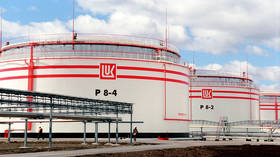
Bulgaria has prematurely scrapped its exemption from the EU ban, which allowed the country to continue buying crude through 2024

© Sputnik / Yuriy Somov
Bulgarian lawmakers have approved a motion that bans purchases of Russian oil for the country’s sole refinery, Neftohim, owned by Russia’s Lukoil, Bulgarian National Television (BNT) reported on Monday.
According to the report, Neftohim will stop exporting petroleum products made from Russian crude starting January 1, 2024, and will completely stop using Russian oil beginning March 1 next year. Bulgaria has been exempt from the EU ban on crude purchases from Russia and allowed to continue buying the fuel for Neftohim until the end of 2024.
However, lawmakers in Sofia have been considering ending the exemption prematurely for several months, despite warnings from Neftohim that an outright ban on Russian crude would pose difficulties for the refinery which is geared to that particular grade of oil. Neftohim is responsible for most of Bulgaria’s diesel and gasoline supplies.
In a statement earlier this month, Lukoil called Bulgaria’s drive toward banning the use of Russian oil at the refinery “biased and discriminatory.” The company pledged to review its business strategy in the country and possibly sell its local assets, including Neftohim.
Meanwhile, the parliament in Sofia also approved a motion that lifts an extra tax on Russian gas transiting through the country. The motion had been filed after Hungary threatened to veto Bulgaria’s bid to enter the EU’s passport-free Schengen zone unless Sofia lifted the levy.
READ MORE: EU state threatens to block fellow member’s NATO bid
In October, Bulgaria imposed an additional tax of 20 lev ($11.16) per megawatt-hour of Russian natural gas entering the country. Hungary, which relies on Russia for most of its gas needs, repeatedly criticized the measure and pressured Sofia to cancel it. Budapest said that it posed a threat to Hungary’s energy security.
For more stories on economy & finance visit RT’s business section




